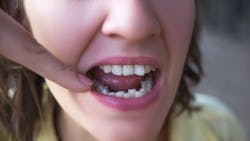"The 6 list" is a recurring feature exploring various topics on oral health, curated for both patients and dental professionals to share with their patients. "6 reasons teeth shift" was medically reviewed by David R. Rice, DDS, chief editor of DentistryIQ.
Braces or clear aligners
For many people, the happiness and relief of their new, straight smile after the years and expense of braces is short-lived as teeth start to shift back to their original positions. It’s disappointing and frustrating, but common. Among the reasons this can happen is that once the pressure from the braces is lost, the ligaments activate their muscle memory and remember the old positions of the teeth, gradually shifting them back.
Age/mesial drift
Also known as physiologic drift, mesial drift refers to the natural lifelong tendency of the teeth to drift toward the front of the dental arch (toward the lips). As well, chewing and grinding the teeth can cause the enamel to wear down, forming gaps that lead to drifting as those spaces grow.
You might also be interested in: 6 reasons for dry mouth
Sleep position (and daytime posture)
Before you hit the hay, beware: your sleeping position can contribute to teeth moving. Stomach- and side-sleeping can lead to such movement, especially for people who sleep mostly on one side. Drooping daytime posture, such as sitting over a computer for long stretches, can also result in shifting over time.
Grinding/bruxism
Teeth-grinding, or bruxism, is a common issue that became more so during the pandemic, and it can increase the likelihood of teeth shifting. The constant application of force on the surfaces of teeth can cause molars to change position, which in turn places stress on surrounding teeth.
Tooth loss or extraction
A missing tooth leaves a space, and the natural response of the other teeth is to creep over to fill it. Wisdom teeth tend to cause overcrowding to begin with, so their loss often doesn’t pose a shifting risk. The greater risk is after the extraction or other loss of a canine or incisor.
Gum disease
Gum diseases can also cause the teeth to shift in several ways. As the inflamed “pockets” enlarge and ligaments holding them in place start to loosen, the teeth may start to shift position. People with gum disease might also experience teeth shifting due to secondary bone loss, which results in less support for the teeth and, for many, drifting.
Through your regular exams and periodic radiographs (x-rays), your dental team will be able to see whether your teeth are shifting and make recommendations, if necessary, to mitigate the issue. But you don’t have to wait for your next checkup—if you’re noticing your teeth shifting, especially if you don’t know why or there’s discomfort, let your dental team know.
About the Author
Elizabeth S. Leaver
Digital content manager
Elizabeth S. Leaver was the digital content manager for Endeavor Business Media's dental group from 2021-2024. She has a degree in journalism from Northeastern University in Boston and many years of experience working in niche industries specializing in creating content, editing, content marketing, and publishing digital and magazine content. She lives in the Boston area.
